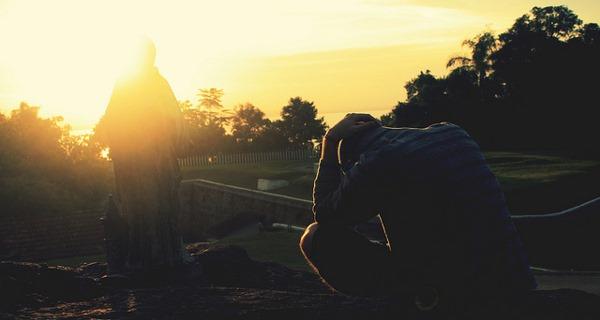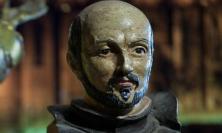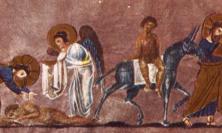‘The cross of Christ is a sign of God’s willingness to forgive us’, writes Russell Pollitt SJ as he concludes our series on the Spiritual Works of Mercy in Laudato si’. As we contemplate our own sinfulness and the ultimate example of forgiveness in these days of Holy Week, we follow Pope Francis in viewing the ecological crisis ‘as a summons to profound interior conversion’, and recognise that true conversion involves sharing God’s mercy with others.
In a ground-breaking interview in 2013, Pope Francis was asked ‘Who is Jorge Mario Bergoglio?’ He responds ‘I do not know what might be the most fitting description… I am a sinner. This is the most accurate definition. It is a not a figure of speech, a literary genre. I am a sinner.’[i]
Pope Francis has consistently spoken of mercy from the beginning of his papacy. One senses that he has had a deep, personal experience of mercy, which he wants to offer to all of us. In this Jubilee Year of Mercy and particularly in these days of Holy Week we too are being invited to recognise our sinfulness and turn to Jesus who is ‘the face of mercy’.[ii] Francis, deeply rooted in the Spiritual Exercises, knows that acknowledging his own sinfulness is not a sign of defeat or that he is a bad person, but rather it is a gateway into an experience of God’s mercy because he, before all else, is loved by God.
Many of us might be tempted to think that acknowledging sinfulness means that I am ‘good for nothing’, but for Ignatius Loyola, our willingness to take responsibility for our sin is our gateway into everything. Ignatius also understands that in order to see our sinfulness we first need to experience the unconditional love of God through a personal relationship with Jesus. When we know we are loved, then we are freed to begin to see ourselves as sinful persons.
Pope Francis explores this idea in Evangelii Gaudium. He writes: ‘Being a Christian is not the result of an ethical choice or a lofty idea, but the encounter with an event, a person, which gives life a new horizon and a decisive direction.’[iii] He then goes to the heart of this encounter that changes us: ‘Thanks solely to this encounter – or renewed encounter – with God’s love, which blossoms into an enriching friendship, we are liberated from our narrowness and self-absorption… For if we have received the love which restores meaning to our lives, how can we fail to share that love with others?’[iv]
In South Africa, the country in which I live, racism has, once again, become a heated national issue. There are many reasons for this but, significantly, one is that many black people feel that white people have not taken responsibility for what happened in the dark days of apartheid. Sometimes one hears white people saying things like, ‘apartheid ended over twenty years ago, we must just get on with it now!’ One black person recently said rather chillingly to a group: ‘We have been told to forgive white people but they have never asked us for forgiveness.’
Forgiving those who have offended us is a power that lies within every person. That power is often released when the offender takes responsibility for what they have done, confronts it, and asks for forgiveness. In the sacrament of reconciliation, we do just that: confront our sinfulness and ask God for forgiveness. We know that when we honestly and courageously confront our sinfulness, God’s mercy abounds – we experience the freedom that forgiveness brings. Mercy becomes a living reality when we, in turn, use the power of our own experience to live the spiritual work of mercy by forgiving willingly.
In his encyclical, Laudato si’, Pope Francis invites us to enter into a process of recognising ourselves as sinners – individually and collectively – who have sinned against creation and against others. Laudato si’ awakens in us the need to take responsibility for our personal sin which has contributed to the degradation of the environment. It calls us to repentance and, in turn, invites us to live God’s forgiveness willingly. It is living this forgiveness that brings freedom: ‘We are able to take an honest look at ourselves, to acknowledge our deep dissatisfaction, and embark on new paths to authentic freedom’.[v]
The pope tells us that, ‘Many things have to change course, but it is human beings above all who need change’.[vi] He goes on to invite us to a new awareness that would enable us to develop new convictions, new attitudes and new forms of life. He says that ‘the ecological crisis is also a summons to profound interior conversion’.[vii] It is precisely our own experience of God’s forgiveness that will help us to this new awareness and profound conversion. What we have received we cannot but want to share with others. This is at the very heart of conversion. Francis also encourages us, if we are tempted to believe we cannot live this profound conversion that, ‘We are always capable of going out of ourselves towards the other’.[viii]
Laudato si’ reminds us that, ‘a healthy relationship with creation is one dimension of overall personal conversion, which entails recognising our errors, sins, faults and failures, and leads us to heartfelt repentance and desire to change’.[ix] Our common sense of sin and need for personal conversion, as individuals, unites us with one another. In our individual need for repentance and conversion, we also recognise our collective need.
When assessing the ecological crisis the world faces, Francis says that it is easy for us to think that the problem is not ours but the sin of another: ‘Politics and economics tend to blame each other when it comes to poverty and environmental degradation. It is to be hoped that they can acknowledge their own mistakes and find forms of interaction directed to the common good’.[x] Our willingness to ‘interact’ with others after acknowledging our own sin is symbolic of our awareness of our collective need for action.
The cross of Christ is a sign of God’s willingness to forgive us; it is the ultimate example to us of the spiritual work of mercy to forgive willingly. Perhaps this is one of the biggest challenges of our times because we live in such a fractured world. In Laudato si’, Pope Francis says:
The human person grows more, matures more, and is sanctified more to the extent that he or she enters into relationships, going out from themselves to live in communion with God, with others and with all creatures… Everything is interconnected, and this invites us to develop a spirituality of that global solidarity which flows from the mystery of the Trinity.[xi]
The willingness to forgive – as we are forgiven because we are loved sinners – is therefore not just a spiritual work of mercy or ingredient of conversion, but an integral component of our very participation in the mystery of the Trinity. Our communion with God is expressed in our willingness to commune with each other. This communion is facilitated by our readiness to forgive willingly. There is no better time than Holy Week to contemplate ‘forgiving willingly’ and, with all our will, imitate what we see.
Russell Pollitt SJ is Director of the Jesuit Institute South Africa.
[i] ‘A big heart open to God’, Thinking Faith, 19 September 2013: http://www.thinkingfaith.org/articles/20130919_1.htm
[ii] Pope Francis, Misericordiae Vultus (2015), §1.
[iii] Pope Francis, Evangelii Gaudium (2013), §7.
[iv] Ibid., §8.
[v] Pope Francis, Laudato si’ (2015), §205.
[vi] Ibid., §202.
[vii] Ibid., §217.
[viii] Ibid., §207.
[ix] Ibid., §218.
[x] Ibid., §198.
[xi] Ibid., §240.






